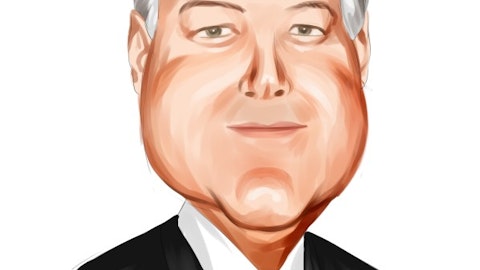Alex Twerdahl: Got it. And then, you know, I also just wanted to ask you guys have always very conservative on your credit underwriting. And I’m not sure we’re seeing a lot of cracks at least visibly. And what’s going on in the market with respect to commercial real estate, multifamily, those types of loans? I’m just curious from where you guys said, if there’s anything that you’re seeing out there that is starting to look like early indications of potential pain or anything that you guys are worried about? Any color would be helpful?
Chris Becker: We really haven’t seen any cracks at this point. I would say in our most recent, we do obviously a pre-analysis every quarter. We look at market data, so a very slight uptick in multifamily vacancies, but nothing that’s causing us concern at this point.
Chris Becker: Okay. Thanks for taking my questions.
Jay McConie: Thanks, Alex.
Chris Becker: Thanks, Alex.
Operator: Thank you. Our next question is from Chris O’Connell of KBW. Chris, you could proceed with your question.
Chris O’Connell: So I was hoping to just get a little bit of clarification as to the fee guidance and where that’s coming out of — to start the year. I think you said $2.5 million a quarter for 2023. So which I guess is that an immediately start at that level in 1Q ’23, and where is like the variance which line items is that coming out of the most relative to where we were in the fourth quarter?
Jay McConie: Right, right. So Chris, we expect our core non-interest income and all the various lines. Obviously, we have some going up, some coming down, but our core interest income is going to be about that $2.5 million throughout the quarter. As Chris alluded to, we’re seeing some pickup in like debit card, credit card activity and then we’re anticipating some loss in NSF fees just because of regulatory and competition within the industry. The real reason for the decline is our pension. So for the past four or five years, our net pension expense in our financials has been a credit to the bank, usually about $100,000 to $135,000 we get a net credit. And part of that is in the non-interest income and part of it is in salary expense.
They make you break out each piece. This year our pension, we have a fully funded pension. The bank hasn’t contribute — had to contribute for well over five, six years to fund it, it’s over 100% funded. But because of the decline in assets or the increase in interest rates and the decline in the fair value of the assets. The GAAP accounting requires you to amortize a loss in that — the assets decreased more than the liabilities and that’s closing the income on average income — our non-interest income going down to $2.6 million. So that’s really — I need to buy that by four, so that’s what’s driving it’s a non-cash item, if interest rates decline and we — the funding position increases, you could see that kind of switch to file on the year.
So it’s a non-cash item that’s really not related to the core business.
Chris O’Connell: Got it. So that’s going to come out of like the other fees line item for you guys and then, like correspondingly on the compensation expense for the most part?


